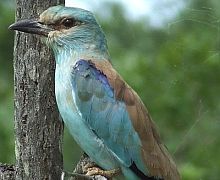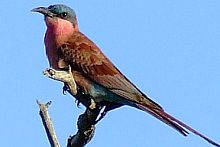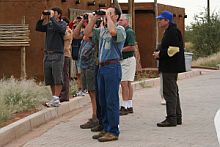Is climate change affecting our birds? Help us find out ...
|
Researchers at the SAEON Ndlovu Node are calling on South Africa's birders to join them in monitoring the impact of climate change on bird migration behaviour in the lowveld and bushveld regions of South Africa.
Volunteers will be asked to record the arrival date of some of the more common, easily identifiable migratory birds in their gardens, farms, workplace or in their favourite birding area.
"We are especially looking for dedicated birders who would be willing to record the arrival date of migrant birds over a number of years," says project manager Nikki Stevens.
Citizen scientists have been assisting SAEON’s Ndlovu Node in their bird monitoring project since 2007. Ndlovu, an observation platform responsible for long-term environmental monitoring in South Africa’s savanna biome, plans to keep the programme running indefinitely as it is yielding valuable and much-needed information to detect reductions or expansions of the ranges of certain savanna bird species.
"Birders have been playing an invaluable role in adding crucial information to the existing knowledge base," says Stevens.
With almost one degree of warming having occurred over the past century, scientific work shows mounting evidence that birds are being negatively affected by the change. Long-term environmental monitoring has indicated that global climate change has already extended plant growing seasons, changed animal and plant distribution patterns, and altered the annual dates of flowering, breeding, and bird migration.
As far as bird migration is concerned, the emerging picture shows that many species that breed in the northern hemisphere have been arriving later than normal in South Africa since the second half of the 20th century. The delayed arrival can result in birds missing important food peaks, which can have disastrous impacts on bird populations.
Important indicators of climate change
"Birds are excellent indicators of climate change as they are very sensitive to climate and weather," Stevens explains. "They are also very important indicators because large amounts of information on their behaviour and migration patterns have been collected by members of the public, specifically in the northern hemisphere."
In Britain, for example, the arrival dates of certain migratory birds have been recorded by members of the Royal Meteorological Society since 1883. This very important long-term series of observations has generated a wealth of valuable long-term data in the northern hemisphere. It is this information in particular that has shed light on how bird-migration patterns are affected by climate change.
Stevens says that there is little long-term data available for Africa. "Global climate change is likely to affect birds here as well, if not already, yet we are still largely unsure of how they are affected," she explains.
It was to help bridge this gap in knowledge that SAEON joined the ranks of organisations involved in gathering information on bird migration two years ago.
So, if you are based in a savanna region and are interested in participating in the project - or have already been collecting such information - please contact Dr Dave Thompson (or Tel 013 735 3535/ 013 735 3534) to register as a participant. Alternatively, download a registration form , email it to birds@saeon.ac.za or fax it to 013 735 3544.





